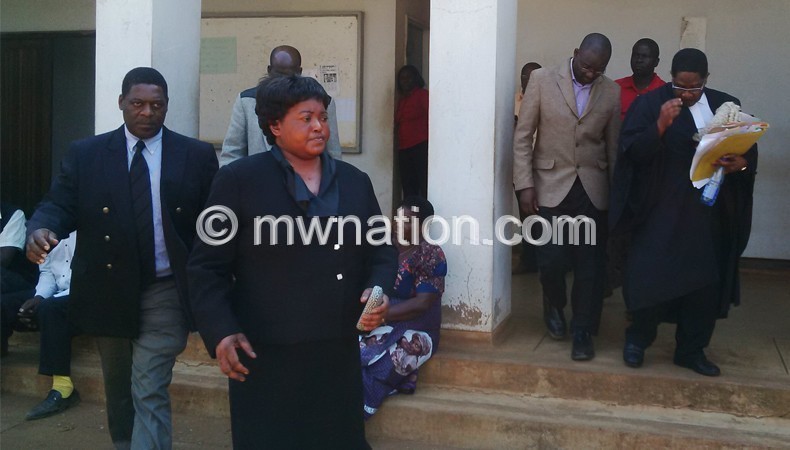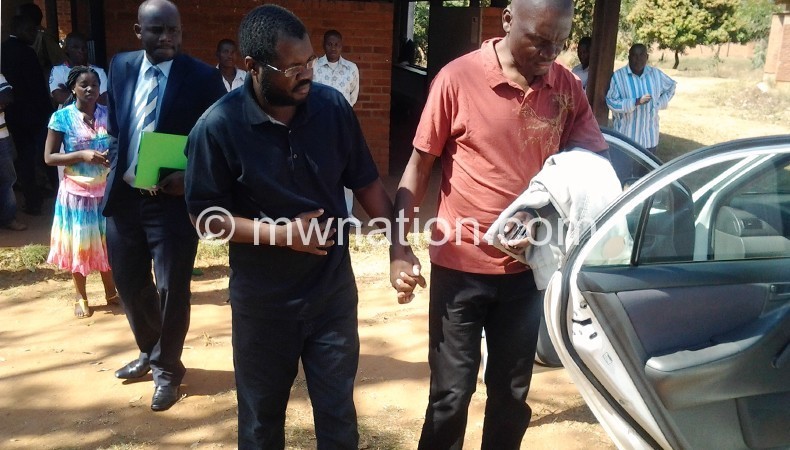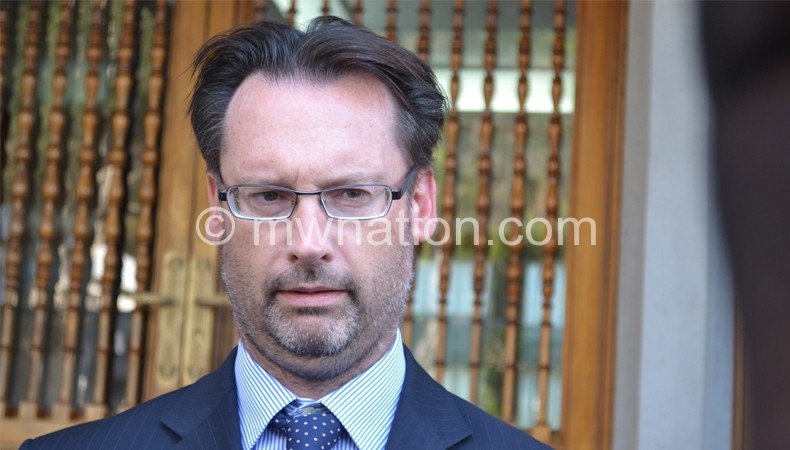UK lawyers in for cashgate
Malawi Government has engaged two former crown prosecutors from the United Kingdom (UK) to provide technical expertise in dealing with issues arising from the Cashgate scandal, including drafting plea bargaining procedures, Weekend Nation has learnt.
The development follows a request the Malawi Government made to the UK’s Department for International Development (DfID) in addressing some of the challenges arising out of the Cashgate affair.

Both the Ministry of Justice and Constitutional Affairs and the British High Commission in Malawi have confirmed the development.
Ministry of Justice and Constitutional Affairs spokesperson Apoche Itimu said following Malawi’s request, DfID engaged the International Centre for Asset Recovery—which is part of the Basel Institute on Governance—to provide capacity building.
The two former prosecutors were subsequently engaged, with one seconded to the Anti-Corruption Bureau (ACB) and the other to the Director of Public Prosecutions (DPP).
In an e-mail interview, British High Commissioner Michael Nevin said: “At the request of the Malawi Government, we continue to provide technical assistance to address the challenges arising from Cashgate, further to the support we provided through Baker Tilly.
“We do not fund investigations, but support the Director of Public Prosecutions and the Anti-Corruption Bureau with expertise that builds capacity in their offices to take forward ‘Cashgate’ investigations and prosecutions.”
Nevin further disclosed that his country’s assistance arises out of an understanding to have suspects involved in Cashgate brought to justice.
“We understand the public’s desire to move more quickly on cases, and we would certainly encourage continued momentum from the criminal justice system as a whole.

“But we are fully behind the good work of the Director of Public Prosecutions and the director of the ACB, as they work together in a coordinated effort to build successful cases, rather than rushing to present weak ones, and which get to the core of those involved in Cashgate. The government and public should give them all the support they need to achieve that,” he said.
The engagement of the prosecutors is not the first time Britain has assisted the Malawi Government in the Cashgate scandal.
In the wake of the Cashgate scandal, Baker Tilly, an international accounting firm, was engaged in October 2013 by DfID to conduct a forensic audit of government’s Integrated Financial Management Information System (Ifmis).
According to sources, the appointment of the technical consultant at the DPP is particularly key considering that he has been instrumental in drafting plea bargaining guidelines that would assist in dealing with Cashgate cases.
The guidelines are intended to deal with serious or complex cases, including Cashgate cases, which will allow suspects to opt for a guilty plea in return for possible reduced sentences.

The move is intended to help the office of the DPP ensure that the ongoing Cashgate cases, which have dragged through the courts for a long time now, are dealt with swiftly.
The guidelines, which Weekend Nation has seen, have been issued in line with sections 76 and 79 of the Criminal Procedure and Evidence Code and “are to be followed by all prosecutors in Malawi engaged in plea discussions in cases of serious or complex fraud”.
“There are plans soon to publish draft rules of court for plea bargaining. Malawi’s Criminal Procedure and Evidence Code have made provision for such rules since 2010. The DPP’s technical adviser is contributing to this process,” said Itimu.
Added Itimu: “In the absence but in anticipation of plea bargaining rules, the DPP has issued guidelines to assist prosecutors involved in plea discussions in all cases of serious or complex fraud, not restricted to Cashgate cases. The guidelines cannot bind the courts or defence lawyers, but are a public statement of how prosecutors will deal with cases before the courts.”
According to the guidelines, any fraud may be regarded as serious or complex if it satisfies, among others, any two of the following conditions:
- Amount obtained or intended to be obtained is alleged to exceed K2 million ($4000)
- There is widespread public concern
- Allegations of substantial and significant fraud on a public body
- Allegations of fraudulent activity against numerous victims
- Significant international dimension.

investigations
The guidelines state that “the prosecutor must always act fairly and in the interests of justice. This means that any plea agreement has to reflect the seriousness and extent of the offence and enables the court, the public and the victims of crime to have confidence in the process.”
In her foreword to the guidelines, DPP Mary Kachale wrote: “due to the high public interest in Cashgate cases, prosecutors cannot afford to enter into plea discussions with the defence as they have done in the past. There is now a greater need for transparency and accountability.”
Further, according to the guidelines, the prosecutor must evaluate the impact of a proposed plea or basis of plea on the community and the victim and on the prospects of successfully prosecuting any other person implicated in the offending.
The development comes amid reports that State agencies such as the ACB and the Ministry of Justice and Constitutional Affairs allegedly engaged some suspects in the massive looting and plunder of public money at Capital Hill on possible deals.
Lawyer DanwoodChirwa views the plea agreements guidelines as a pragmatic way of handling the Cashgate offences.
“The guidelines don’t seem to be rigid, which is a good thing,” observed Chirwa.
He said the presupposition is that plea agreements can help to bring to book more Cashgate offenders than would be possible without this mechanism.
He has, however, pointed out that one obvious problem with the manner in which the guidelines have been framed is that they seem to say that plea agreements are applicable to certain offences only—fraud of the Cashgate type.
“There is no reason why the rules should only be applied to Cashgate cases and there is a need to avoid creating the impression that Cashgate offenders are privileged criminals,” Chirwa said.
Our sister paper Nation on Sunday reported in October 2014 that several suspects had held discussions with the ACB on the possibility of becoming State witnesses, including one of the main Cashgate suspects Oswald Lutepo.
Part of the deal, as reported by the paper, was that those suspected to have taken part in the scam would disclose vital information to government on how best to recover the stolen money in exchange for leaner jail terms.
Following the conviction of another Cashgate suspect Treza Senzani, who returned to the State part of her wealth and received a three-year sentence, there was a public outcry over how the State had handled the matter, raising fears that the former principal secretary had gotten away with lenient charges following discussions with the State.
Attorney General Kalekeni Kaphale is on record to have told Parliament’s Legal Affairs Committee that plea bargaining was the only way government could recover Cashgate related properties and in the process quicken investigations and prosecution of the cases.
ACB deputy director Reineck Matemba is also on record that his office has so far received requests from several lawyers representing Cashgate suspects for the bureau to consider bargaining with their clients.
But Matemba declined to reveal the names of people that have approached the bureau to avoid jeorpadising the prosecution.
In an interview on Friday, Matemba said the rules set aside are meant to guide them but each case would be assessed on its own merits.
“The cases the ACB is handling are at different stages; some are at an advanced stage while others have not yet started. We will be liaising with the DPP as well as lawyers representing the accused. The bureau, however, will not force anyone else for plea-bargaining,” he said.





